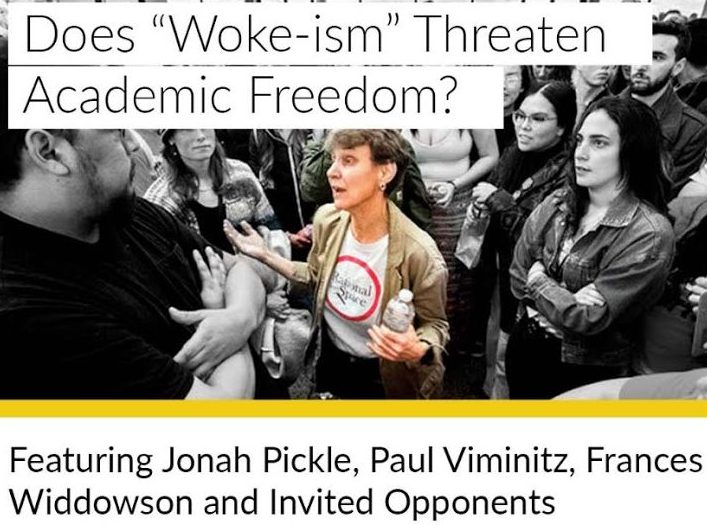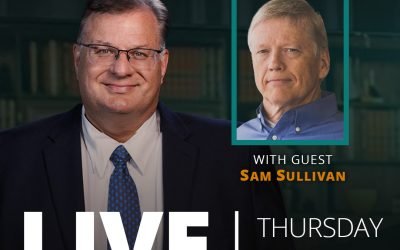“Any presentation worth banning is a presentation worth attending.” So said Richard Mueller, an economics professor at the University of Lethbridge, on September 16 at the Lethbridge Public Library. Mueller was paraphrasing biochemist and writer Isaac Asimov who famously stated, “Any book worth banning is a book worth reading.” Mueller made this reference while being the moderator for the “Does ‘Woke-ism’ Threaten Academic Freedom?” event sponsored by the Frontier Centre for Public Policy, the Society for Academic Freedom and Scholarship, and the Justice Centre for Constitutional Freedoms.
In these introductory remarks, Mueller was referring to my cancelled talk at the University of Lethbridge on February 1, 2023. This talk, on “How ‘Woke-ism’ Threatens Academic Freedom,” was ironically not allowed to go ahead because “woke” university administrators, faculty members, students and the faculty association claimed that my views on the residential schools were “harmful,” implying that my views conflicted with the university’s official commitment to “truth and reconciliation” with indigenous peoples.
Although I invited 10 people from the University of Lethbridge who supported the February 1 cancellation to sit on the debating panel, none accepted and so the event went ahead with three participants arguing “yes” – that “woke-ism” did threaten academic freedom. These participants included Paul Viminitz (the professor who invited me to speak), Jonah Pickle (a student who wanted to hear my talk), and me. The three participants are also notable because we are suing the University of Lethbridge for violating our freedom of expression rights. We are being represented by one of the sponsors of the event, the Justice Centre for Constitutional Freedoms.
In spite of sharing many points of agreement, the presentations were notable because of the different lenses that were used to examine the question. Viminitz’s presentation, for example, reflected his philosophical leanings and discussed several intersecting sociological phenomena that result in the silencing and cancelling that are associated with “woke-ism.” The most significant, according to Viminitz, was what Jonathan Haidt has referred to as “the coddling of the American mind.” This was illustrated by University of Lethbridge Vice Provost (Students) Kathleen Massey’s email to all of Viminitz’s students that they could be excused from attending my guest lecture for his class if they believed it would “cause harm.”
My presentation was much more strident and political than Viminitz’s, and reflected my own outrage at being constantly defamed and ostracized as a hateful harasser and “epistemic terrorist” by the anti-intellectual and totalitarian identity politics that is “woke-ism.” In reaction to this, I referred to what happened on February 1 as a “clown show” (defined as “when people are really screwing up an activity that should be fairly straight forward”) and introduced the arguments of those who supported my cancellation thusly: “Bring in the clowns!” For me, universities are under serious threat from a reactionary anti-Enlightenment mob. If we want to save our universities, we need to fight back now with everything that we have before it is too late.
Perhaps the most interesting “lens” came from Jonah Pickle’s presentation. Pickle, a fourth year neuroscience student, was able to articulate very clearly what is at stake for young people who are seeking an education in a “woke” university environment. What he made clear is that what students are receiving is not education, but indoctrination. He explained how students are being subjected to mandatory “training,” and disciplinary action can be meted out if they do not follow the “woke” orthodoxy. Students are afraid to speak their minds and to disagree with their “woke” professors for fear of being penalized. He also pointed to “woke-ism”’s opposition to the pursuit of a universal truth, and explained how this justifies censoring ideas that are perceived to be psychologically harmful (because there is no truth to be found anyway.) Pickle pointed out that this is, in fact, contrary to the university’s mission of helping students to understand complex viewpoints.
The three presentations and the hour of questions and answers that followed enabled many of the destructive aspects of “woke-ism” to be examined. What was missing was a defense of “woke-ism.” This, of course, is not surprising as “woke-ism” maintains that engaging in this discussion would itself cause “harm.” What we have is a different conception of a university. As Jonah Pickle asked: “What is it that we want from a university?” Should a university be preoccupied with protecting identities, or will critical thinking be encouraged to reach a better understanding of the world?
We can’t have both no matter how much the “woke” claim otherwise.
You can watch the full lecture here. (2 hours 45 minutes)
Frances Widdowson is a Senior Fellow at the Frontier Centre for Public Policy



